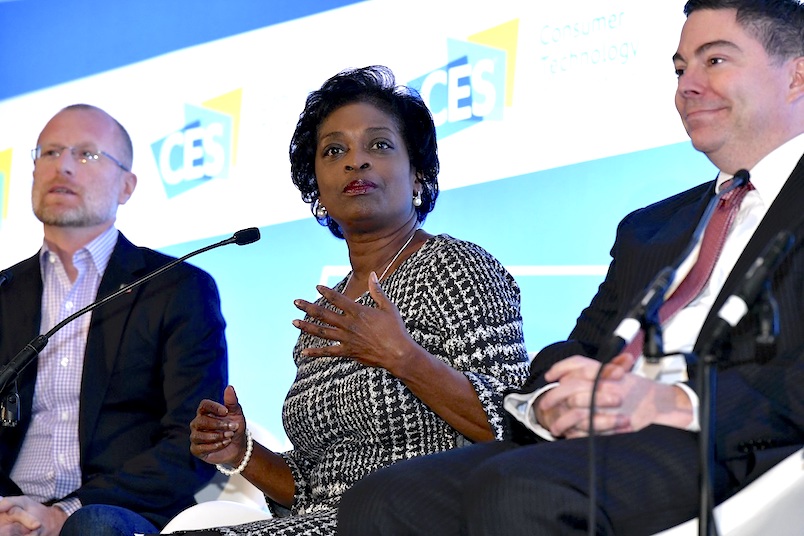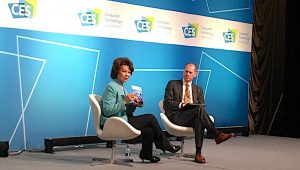 EMERGING TECH
EMERGING TECH
 EMERGING TECH
EMERGING TECH
 EMERGING TECH
EMERGING TECH
Wandering the trade show aisles showcasing talking robots, large screen TVs and the latest smartphones at the Consumer Electronics Show in Las Vegas this week were a Cabinet secretary and commissioners from the Federal Communications Commission and the Federal Trade Commission. All of them proclaimed their love of innovation and a commitment to letting technology thrive.
Yet their public comments during the gathering carried a message far more disturbing to the technology audience. The gap between what the tech community wants and what the government will support is widening and this may have far-reaching consequences for the prospects of some major industries.
The future of autonomous cars? Nothing will be approved until safety is assured. Drone flights over populated areas? There’ll be a lengthy series of pilot programs, but don’t hold your breath. Net neutrality? The FCC has spoken and good luck getting Congress or the courts to challenge its authority.
“Technologies are not without risk and they are not without cost,” Transportation Secretary Elaine Chao said during an appearance at the annual tech gathering on Wednesday. “The public will need to have confidence that all of their concerns have been adequately addressed.”
Chao’s comments came in response to questions from Gary Shapiro, president and chief executive officer of the Consumer Technology Association, about her agency’s plans for regulating drones and autonomous cars. She chose her CES appearance to announce that the U.S. Transportation Department would be publishing four requests for public comment on how to streamline transportation alternatives to allow for autonomous driving and other technologies.
But Chao also cautioned CES attendees that the tech industry will still need to embark on a major education campaign if it expects to see the government permit self-driving cars in the U.S. “Seventy-one percent [of U.S. citizens] are not comfortable with driverless cars,” Chao said. “A large portion of our population are not familiar with this emerging technology and they are uneasy.”

Transportation Secretary Elaine Chao with CES CEO Gary Shapiro (Photo: Mark Albertson)
Whether people are uneasy or not, autonomous cars are hitting the streets. It’s not clear whether Chao took advantage of the opportunity during her stay in Las Vegas, but if she stepped outside the convention hall she could have jumped in a number of autonomous vehicles roaming parking lots and even the traffic-snarled streets. Lyft was showcasing a fleet of BMW sedans equipped with Aptiv self-driving technology and plenty of attendees lined up to take a ride.
Regulation of drones in U.S. airspace is also a thorny problem for Chao’s agency. On the surface, President Donald Trump appears willing to embrace the potential of drone technology, directing Chao in October to launch an initiative which would safely test and validate unmanned aerial vehicles. Chao pointedly announced that the 1 millionth drone was registered through her agency’s program as she spoke during CES on Wednesday.
But a patchwork of federal court rulings, conflicting state laws and the lack of definitive rules from the Federal Aviation Administration has frustrated commercial and hobbyist drone users alike. A series of pilot programs have been ongoing for well over two years. And on the “uneasy” scale, flying objects rank right up there with driverless cars in the minds of some government officials.
“You really cannot have a drone fly over the heads of people,” Chao said on Wednesday.
The first major headline of CES happened days before the start of the show when FCC chairman Ajit Pai withdrew from a scheduled appearance, citing personal threats in the wake of his support for rolling back net neutrality. The commission’s action in December allowed service providers to block or slow down select internet sites or services.
Nevertheless, three of his fellow commissioners made a heavily guarded appearance during CES and they were not shy about addressing the elephant in the room, unlike a previous appearance at a Silicon Valley tech gathering in September.
“It’s what I call the ‘Destroying of Internet Freedom’ order,” said Commissioner Mignon Clyburn (pictured, center, with commissioners Brendan Carr, left, and Michael O’Rielly), who is one of the two appointees on the five-member body to vote against the rollback. “This is a very teachable moment.”
When asked about next steps, O’Rielly, a supporter of the rollback, envisioned potential votes in Congress followed by a process of legal rulings that could drag on for some time as the issue makes it way ultimately to the U.S. Supreme Court. “I expect this one will go there as well,” O’Rielly shrugged.
As if the tech industry did not have enough regulatory headaches, the acting chair of the FTC, Maureen Ohlhausen, told CES attendees that her agency would closely scrutinize privacy and cybersecurity practices and punish companies that were careless about handling data. “We’ve taken actions against companies that have neglected obvious flaws once they’ve become aware of them,” Ohlhausen said. She also indicated that the FTC could step into the net neutrality issue, but the agency is seriously hampered by a lack of commissioners. Only two officials currently occupy the five slots.
The pace of government approval is going to take far longer than most technology executives will accept. There is also the problem of getting U.S. officials to see the technology industry’s point of view.
On Thursday, Vice President Mike Pence visited Las Vegas to promote the Air Force’s AFwerX innovation hub at a venue less than two miles from the CES event. Somehow, the second-highest ranking member of the U.S. government just couldn’t find time to appear before the largest technology gathering of the year.
Support our mission to keep content open and free by engaging with theCUBE community. Join theCUBE’s Alumni Trust Network, where technology leaders connect, share intelligence and create opportunities.
Founded by tech visionaries John Furrier and Dave Vellante, SiliconANGLE Media has built a dynamic ecosystem of industry-leading digital media brands that reach 15+ million elite tech professionals. Our new proprietary theCUBE AI Video Cloud is breaking ground in audience interaction, leveraging theCUBEai.com neural network to help technology companies make data-driven decisions and stay at the forefront of industry conversations.